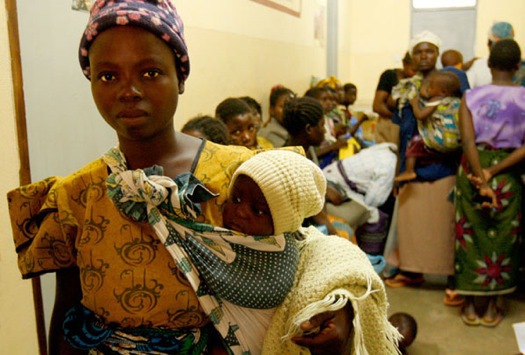
Deployed in Zambia and, soon, Malawi, Project Mwana allows for the efficient testing of infants and gives reminders for followup care. Photo: Merrick Schaefer/UNICEF
For mothers and newborns, early medical diagnostic testing is critical to health, especially for detecting and treating HIV/AIDS. But in some developing countries, sending and receiving a blood sample from an extremely remote location is an arduous task that can take between two and five months. Project Mwana, a collaboration between UNICEF Innovation Initiative, the Zambian government, Frog Design and other partners, is changing that by utilizing Rapid SMS technology to deliver the test results instantly. “Test results have a significant impact on infant mortality, especially if retro-viral treatment is needed,” says Erica Kochi, a communications specialist at UNICEF Innovation. “Time is of the essence.”
Project Mwana, which is now moving from pilot to implementation phase in Zambia and soon in Malawi, is composed of two related initiatives: Results 160, focusing on accelerating transmitting lab results for early infant diagnosis of HIV/AIDS; and Remind Me, a patient tracing system that notifies community health workers to check up on mothers and infants. Both make use of mobile networks and SMS technology “as a support tool to link to the formal health system to coordinate and measure kids getting treatment,” explains Merrick Schaefer, technical project manager at UNICEF Innovation.
In the case of HIV/AIDS, early diagnosis is crucial to prevent transmission and for early treatment. But that is often not possible because of the poor transportation infrastructure. In rural Zambia, for example, where one of the pilots for Project Mwana took place, the dried blood sample must travel via an unreliable ad hoc courier system – a guy on a bike, perhaps, or an NGO worker who is passing through – to one of only three labs in the country capable of HIV testing. And then it must return the same way.
A post-natal checkup reminder is important because there is a significant loss of follow-up medical care in rural areas. Many women have to walk long distances to a clinic, and seek medical help only if a child is sick. Community health workers, who take on the bulk of health intervention, are pivotal to this “type and trace” messaging system: it allows them to register births, which then automatically triggers a reminder to find the mother and encourage her to return for a post-natal checkup. The results are then typed into the messaging system to maintain accurate health monitoring.
Project Mwana, whose pilot was funded by UNICEF, Boston University, and the Clinton Health Access Initiative, is part of a wider effort by designers to deploy mobile technology for social innovation, such as Frog Design’s Project Masiluleke, which tackles the HIV epidemic in KwaZulu Natal, South Africa.
“There is a low literacy rate [in these countries] but text message services are used and highly valued,” notes Robert Fabricant, vice president creative at Frog Design. “Most people can find someone who can text, so it’s often not the barrier people think it is.” Last year, Frog launched Mobile Mandate, the company’s umbrella initiative to leverage mobile technology – in collaboration with NGOs, designers, technology companies and social entrepreneurs — in design for social change projects.
